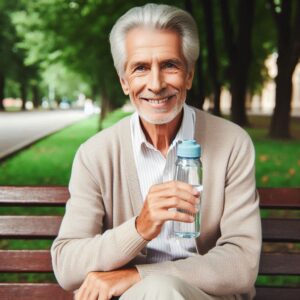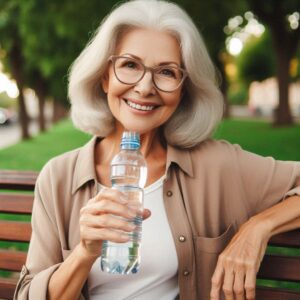Water plays an indispensable role in maintaining multiple bodily functions. It helps regulate body temperature through perspiration, assists in digestion by dissolving nutrients, and facilitates the removal of waste through urine and feces. As we age, our bodies become less efficient in conserving water and managing these processes, making sufficient hydration vital.
Older adults are more prone to conditions such as urinary tract infections (UTIs) and kidney stones, both of which can be exacerbated by dehydration. Proper fluid intake helps dilute urine, reducing the risk of UTIs and kidney stones. Maintaining optimal hydration can significantly enhance physical health and prevent these painful conditions.
 Even mild dehydration can impair cognitive functions, leading to problems such as confusion, short-term memory loss, and decreased attention span. Clinical studies have shown that dehydration can adversely affect mood and mental performance. Ensuring enough fluid intake can help retain cognitive faculties, thereby supporting mental health and functional independence.
Even mild dehydration can impair cognitive functions, leading to problems such as confusion, short-term memory loss, and decreased attention span. Clinical studies have shown that dehydration can adversely affect mood and mental performance. Ensuring enough fluid intake can help retain cognitive faculties, thereby supporting mental health and functional independence.
Water helps soften stool, making it easier to pass and thus preventing constipation. Older adults who do not consume enough fluids may experience chronic digestive issues, which can lead to discomfort and reduced quality of life. Proper hydration helps the digestive system break down food more effectively, ensuring that important nutrients are absorbed efficiently. This is important for older adults, who may have specific dietary requirements and must maximize nutrient intake to maintain health.
With aging, muscle mass tends to decrease, and joints may become less flexible. Water is necessary for keeping muscles hydrated and joints lubricated, aiding in mobility and physical comfort. Adults who stay well-hydrated can benefit from improved muscle function and reduced joint stiffness, making it easier to stay active and independent. Hydration helps in the delivery of nutrients to muscle cells, which is essential for maintaining muscle mass and strength. This is important for older adults engaged in physical activities or exercises.
Seniors’ immune system’s efficiency tends to decline, making them more susceptible to infections. Proper hydration supports the immune system by aiding in the removal of toxins and ensuring that cells are optimal. Maintaining adequate hydration, older adults can enhance their immune resilience, reducing the likelihood of infections and promoting quicker recovery from illnesses.
Many older adults take medications that can affect their hydration status. Uretics are commonly prescribed for conditions such as hypertension but increase the risk of dehydration by promoting urine production. Chronic conditions such as diabetes, heart disease, and kidney disease require careful management of fluid intake. Proper hydration helps manage these conditions effectively, reducing symptoms and improving overall health outcomes.
Signs of Dehydration in Seniors
The most immediate and noticeable signs of dehydration are a dry mouth and throat. Saliva production decreases when the body lacks sufficient fluids, leading to a dry, sticky feeling in the mouth. This can make swallowing difficult and may further discourage fluid intake, exacerbating dehydration.
In a well-hydrated individual, urine is light yellow. Dehydration causes the urine to become concentrated and darker in color, ranging from deep yellow to amber. Monitoring urine color can provide a quick and easy assessment of hydration levels.
Older adults who are dehydrated may urinate less often and in smaller amounts. This reduction in urine output can indicate severe fluid deficiency and warrants immediate attention.
Lack of hydration can lead to general feelings of fatigue and weakness. Dehydration disrupts the normal functioning of cells and organs, resulting in decreased energy levels. Older adults may find it increasingly difficult to perform daily activities and may experience an overwhelming sense of tiredness.
Dehydration can lead to a drop in blood pressure, causing dizziness or lightheadedness, particularly when standing up quickly from a sitting or lying position. This condition, known as orthostatic hypotension, can increase the risk of falls and related injuries in seniors.
Confusion, disorientation, and difficulty concentrating can arise when the brain does not receive the fluids it needs to function correctly. These symptoms are often mistaken for signs of dementia or other cognitive disorders but can be reversed with proper hydration.
Older adults may experience dry and cool skin when dehydrated. As the aging process affects skin elasticity, turgor (the skin’s ability to change shape and return to normal) is also impacted. A simple skin test involves gently pinching the skin on the back of the hand: if it does not return to its normal position quickly, this may indicate dehydration.
Dehydration can cause a rapid heart rate (tachycardia) and increased respiratory rate. The body attempts to maintain adequate circulation and oxygen supply when fluids are low, leading to these physiological changes. These signs can indicate severe dehydration requiring urgent medical attention.
Another visual cue is sunken eyes, which can occur when the body loses significant fluids and the tissues around the eyes become dehydrated.
Strategies for Staying Hydrated
Older adults often have a diminished sense of thirst, so drinking water consistently throughout the day, rather than waiting for thirst to occur, is important. Establishing a routine where water or other fluids are consumed at specific times, such as before meals or during medication intake, can help in maintaining this habit.
Offering a variety of beverages can make hydration more pleasant. Providing options like herbal teas, low-sugar fruit juices, milk, or non-dairy alternatives, and broths can add variety. These alternatives supply additional nutrients.
 Fruits and vegetables contain high water content and can significantly contribute to daily fluid intake. Including foods such as watermelons, cucumbers, oranges, and leafy greens in meals can boost hydration levels naturally. These foods are easy to integrate into the diet and can be included in salads, snacks, and desserts.
Fruits and vegetables contain high water content and can significantly contribute to daily fluid intake. Including foods such as watermelons, cucumbers, oranges, and leafy greens in meals can boost hydration levels naturally. These foods are easy to integrate into the diet and can be included in salads, snacks, and desserts.
Using hydration reminders can be practical for seniors who might forget to drink fluids regularly. Setting alarms on phones or clocks can provide timely reminders. Hydration apps are available and can send notifications to drink water at predetermined intervals. Placing sticky notes in visible areas like the kitchen or bathroom can serve as constant visual cues.
Keeping water bottles or glasses of water within reach in commonly frequented areas, such as the living room, kitchen, and bedroom, encourages frequent sipping.
Enhancing the flavor of water can make it more appealing for those who find plain water uninviting. Adding slices of fruits like lemons, limes, or cucumbers, or a splash of fruit juice, can improve the taste without adding unhealthy sugars.
Keeping a daily log of how much fluid is consumed helps ensure that hydration goals are being met. This can be done through simple charts or journals, allowing caregivers and older adults to see patterns and make necessary adjustments.
Educating older adults and their caregivers about the signs of dehydration is vital for early intervention. This knowledge empowers them to take timely action to prevent serious complications.
Some older adults may reduce their fluid intake to minimize bathroom trips or due to mobility issues. Ensuring easy access to bathrooms or using absorbent products can also alleviate concerns related to frequent urination.
Health conditions and medications can affect hydration requirements. Regular consultations with healthcare professionals ensure that fluid intake aligns with overall health goals and that any specific medical considerations are appropriately managed.